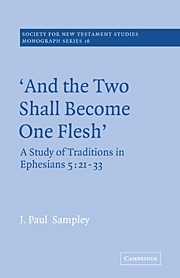Book contents
- Frontmatter
- Contents
- Dedication
- Preface
- Acknowledgments
- I Introduction of problem and perspective
- II Outline of the epistle to the Ephesians and the author's knowledge of his readers
- III Identification and study of traditional materials in 5: 21–33
- IV Three passages from the homologoumena especially related to 5: 21–33
- V Hermeneutical problems in 5: 31–2
- VI The movement of thought in 5: 21–33
- VII Detailed analysis of 5: 21–33
- VIII Concluding observations
- Bibliography
- Indexes (passages cited, authors, subjects, selected Greek words)
IV - Three passages from the homologoumena especially related to 5: 21–33
Published online by Cambridge University Press: 29 September 2009
- Frontmatter
- Contents
- Dedication
- Preface
- Acknowledgments
- I Introduction of problem and perspective
- II Outline of the epistle to the Ephesians and the author's knowledge of his readers
- III Identification and study of traditional materials in 5: 21–33
- IV Three passages from the homologoumena especially related to 5: 21–33
- V Hermeneutical problems in 5: 31–2
- VI The movement of thought in 5: 21–33
- VII Detailed analysis of 5: 21–33
- VIII Concluding observations
- Bibliography
- Indexes (passages cited, authors, subjects, selected Greek words)
Summary
There are in the homologoumena three passages that bear a certain relationship to Eph. 5: 21–33, especially with regard to similar formulations and associations of terminology and ideas. The first of these is 1 Cor. 6: 12–20.
‘All things are lawful for me’, but not all things are helpful. ‘All things are lawful for me’, but I will not be enslaved by anything. ‘Food is meant for the stomach and the stomach for food’ – and God will destroy both one and the other. The body is not meant for immorality, but for the Lord, and the Lord for the body. And God raised the Lord and will also raise us up by his power. Do you not know that your bodies are members of Christ? Shall I therefore take the members of Christ and make them members of a prostitute? Never! Do you not know that he who joins himself to a prostitute becomes one body with her? For, as it is written, ‘The two shall become one.’ But he who is united to the Lord becomes one spirit with him. Shun immorality. Every other sin which a man commits is outside the body; but the immoral man sins against his own body. Do you not know that your body is a temple of the Holy Spirit within you, which you have from God? You are not your own; you were bought with a price. So glorify God in your body.
- Type
- Chapter
- Information
- 'And The Two Shall Become One Flesh'A Study of Traditions in Ephesians 5: 21-33, pp. 77 - 85Publisher: Cambridge University PressPrint publication year: 1971



